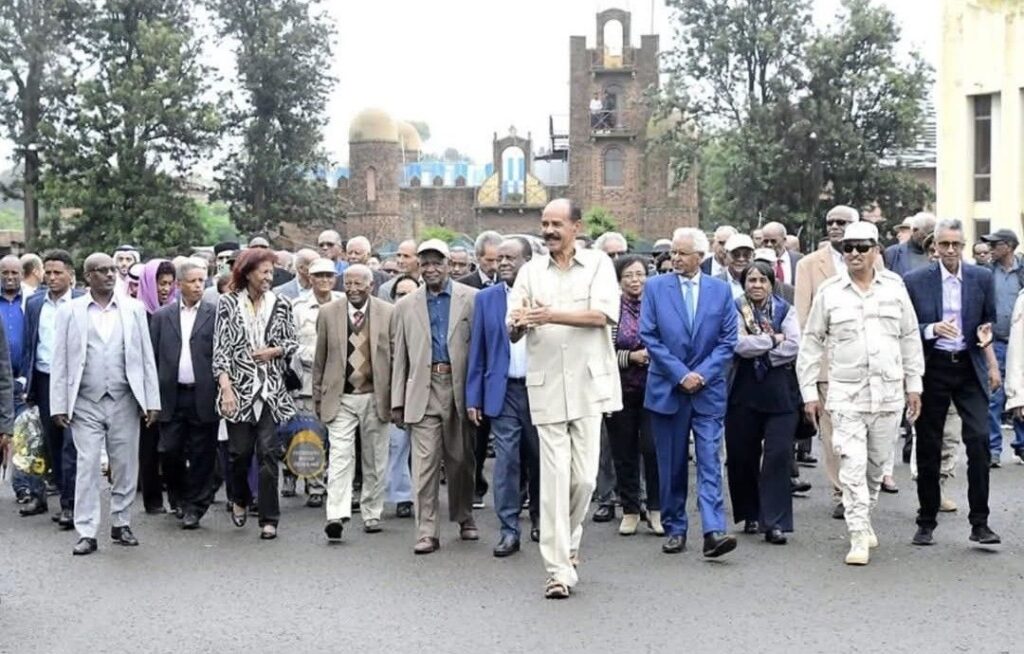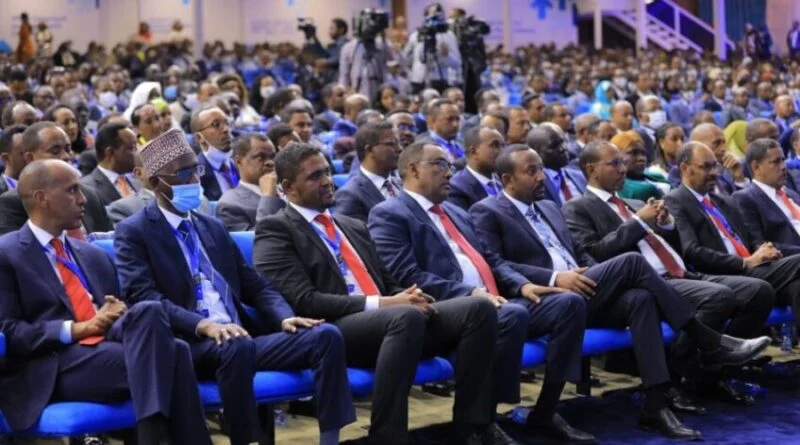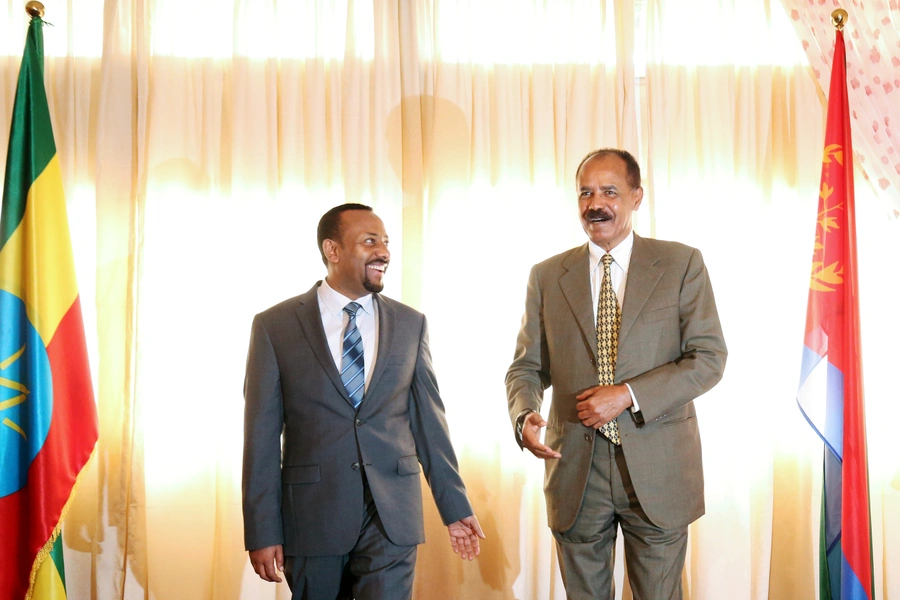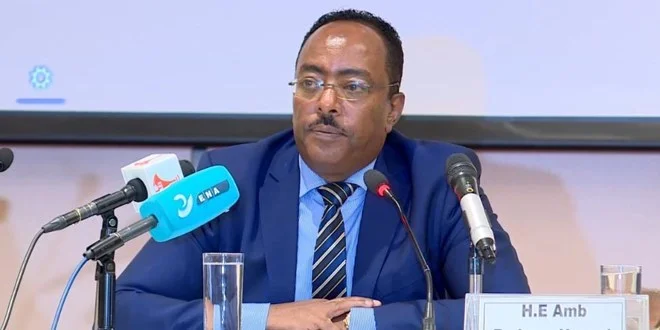
Getachew Reda speaking at a media briefing
Power struggles are not new to Ethiopia and Eritrea. Both nations have long history of wars, and authoritarian control. Yet today, the crisis is deeper and more insidious than in the past. Beyond armed conflict or repression lies a systemic erosion of principled leadership. What dominates the political landscape is no longer statesmanship, but the rise of cadres—loyal functionaries whose careers depend on obedience rather than vision or integrity.

Eritrean President Isaias Afwerki walks with government officials
Eritrea: The Cadre State Perfected
Today, in Eritrea, the political culture rewards obedience, not service, and – obedience above all else. Eritrea has long embodied this system: under the PFDJ, advancement is tied entirely to loyalty to the dictator Mr Isaias Afwerki, while independent thought is punished. Officials are executors, not thinkers. Eritrea is the pure form of the cadre state
Ethiopia’s Cadre state Dilemma
Ethiopia’s current political landscape is shaped by the rise and entrenchment of a cadre state—a system where loyalty and obedience to the ruling party are rewarded above integrity, competence, or vision. In this environment, statesmanship and principled leadership have all but disappeared, replaced by functionaries who thrive through allegiance rather than merit. The result is a political culture sustained by disinformation, coercion, and patronage, instead of genuine service to the people.
The persistence of the cadre system is reinforced by structural problems. Survival for many professionals, including teachers, doctors, and civil servants, depends on political loyalty, as their wages are insufficient to ensure independence. This dynamic fosters a climate where professionals are compelled to prioritise obedience to the ruling party over acting with principle.

Prime Minister Abiy Ahmed of Ethiopia participates in a Prosperity Party meeting with senior party members
The opportunistic elite
Getachew Reda :The recent interview of Mr Getachew Reda on Global Power Shifts prompted me to write this piece, though the subject has occupied my thoughts for quite some time. Getachew Reda’s trajectory is emblematic—not an anomaly, but a clear manifestation of Ethiopia’s deeper systemic challenges.
Previously, Getachew was a prominent executive member of the TPLF, playing a pivotal role in mobilising Tigray’s youth against the central government. Today, he serves within the very administration he once vehemently criticised. This stark reversal is indicative of a broader trend in Ethiopian politics: personal convictions are frequently set aside in favour of survival, and loyalty to the prevailing power structure eclipses integrity. Getachew’s journey encapsulates how the dominance of cadre politics has supplanted statesmanship in the current climate.
This is not a story of reconciliation, but of survival. In Ethiopia, loyalty is valued far more than integrity.

Getachew Reda speaking at a media briefing
Redwan Hussein’s career follows a similar pattern. Formerly an EPRDF member, he transitioned to the Prosperity Party, illustrating how careerism routinely overtakes ideology. These examples are not isolated; they reflect a political system that prizes obedience and loyalty above competence and principle.
The media landscape has undergone a significant transformation. While Ethiopia was never known for truly independent media outlets, the Prosperity Party has escalated matters by routinely recruiting media personalities to broadcast political messaging. Disinformation frequently replaces the truth, rendering public discourse increasingly hollow. In such an environment, career progression and even personal survival depend on unwavering loyalty, further entrenching the cadre system and sidelining authentic statesmanship.
Economic Incentives and Systemic Survival
The rise of cadres is not accidental; it is structurally reinforced by economic conditions. In Ethiopia, doctors, university instructors, and civil servants earn as little as $70 per month. Survival for educated professionals is almost impossible without aligning with the ruling party. By contrast, cadres are often given access to resources, patronage networks, and opportunities to exploit public assets.
This creates a deliberate political economy of obedience: independent thinkers struggle to survive, while loyalty is rewarded with wealth and influence. Eritrea has already experienced the consequences of such a system: decades of enforced loyalty, low wages, and repression have emptied the country of much of its educated class. Ethiopia is now in the same trajectory.
Consequences of Cadre Politics
The effects are profound:
- Opportunism and betrayal become normalized.
- Media becomes a tool of disinformation, rather than accountability.
- National resources are squandered on patronage, leaving citizens impoverished.
- Skilled labor drains abroad, emptying the country of talent.
- Trust and vision disappear, replaced by short-term survival strategies.
Breaking the Cadre State: The Path to Statesmanship

President Isaias Afwerki of Eritrea and Prime Minister Abiy Ahmed of Ethiopia pose together
One of the most damaging legacies of authoritarian politics is the creation of a cadre state — a system where loyalty, obedience, and propaganda are rewarded more than integrity, competence, or vision. In such an environment, functionaries thrive, but statesmen vanish. The result is a political culture where power is sustained through disinformation, coercion, and patronage rather than service to the people. Ethiopia today is a striking example of this dilemma.
Solving the cadre problem does not begin with speeches about morality. It requires structural changes that make independence possible and statesmanship viable.
True reform must begin with the removal of entrenched authoritarian systems — including Prime Minister Abiy Ahmed and President Isaias Afwerki, along with their respective ruling parties, the Prosperity Party (PP) and the People’s Front for Democracy and Justice (PFDJ). These entities have institutionalized obedience, fear, and patronage over merit and accountability.
A post-authoritarian transition should prioritize on economic reform. Teachers, doctors, and civil servants must earn a living wage that frees them from political dependency. When survival is no longer tied to party loyalty, professionals can afford to act with principle.
Similarly, civil service must be professionalized. Hiring and promotions should be based on open competition, not political allegiance. This creates a public administration where skill and integrity matter more than proximity to the ruling party. A merit-based system makes it harder for propaganda-driven loyalists to dominate.
Finally, both countries needs political reforms that reduce the zero-sum nature of power. As long as losing an election means total exclusion, parties will prefer cadres who guarantee loyalty over statesmen who act with independence. Fairer rules of competition, transparent financing, and internal party democracy can open the way for new leadership.
The cadre system survives because it is profitable for those in power. It can only be dismantled when institutions make principle more rewarding than obedience. The transition from cadre state to statesmanship is not just Ethiopia’s or Eritrea’s challenge — it is the essential step for any society that wishes to replace propaganda with truth, fear with trust, and loyalty to party with loyalty to nation.
The ultimate goal is to rewire incentives: when integrity, competence, and service to the public are rewarded — while blind obedience and opportunism no longer guarantee survival — the system begins to produce statesmen instead of cadres.

Redwan Hussien, Director General of NISS, giving a media briefing.
Conclusion
Ethiopia and Eritrea are cadre states – where loyalists dominate, while principled leadership struggles to emerge. Economic hardship, media control, and structural incentives perpetuate this system, producing a political culture where loyalty trumps service.
Breaking the cycle requires deliberate reforms: starting with political reform followed by economic reform : fair wages, meritocracy, civic empowerment. Only then can statesmen arise, guiding nations with vision, integrity, and accountability. Until that happens, both Ethiopia and Eritrea risk remaining trapped in cycles of obedience, betrayal, and wasted potential.
Leave a Reply